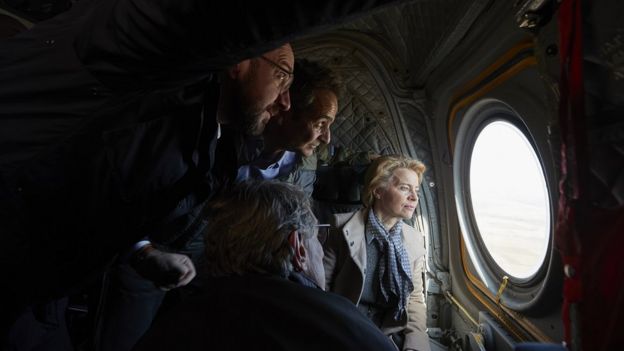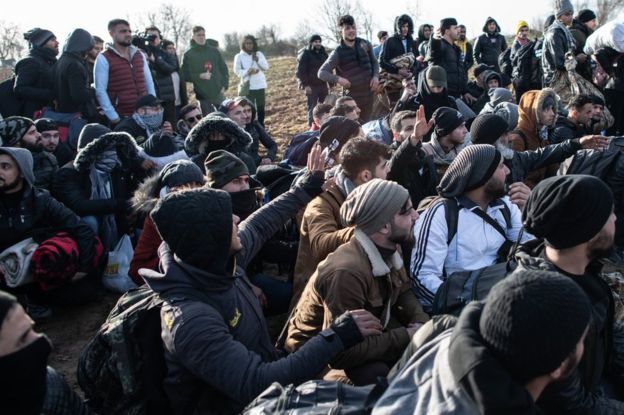The head of the European Commission has sent a strong message of support to Greece in its attempts to stop migrants crossing its border from Turkey.
“Our first priority is to ensure order is maintained at the Greek external border, which is also a European border,” Ursula von der Leyen said.
She promised Greece, which she called a “European aspida [shield]”, €700m (£608m; $780m) in financial aid.
Turkey lifted controls on migrants exiting for the EU on Friday.
It took the decision after suffering a heavy military loss in north-west Syria, where it has been trying to create a safe area to resettle millions of Syrian refugees it took in during the ongoing civil war.
At least 24,000 people have been stopped from crossing the border from Turkey since Saturday, according to Greek government figures.
Austrian Prime Minister Sebastian Kurz has accused Turkish President Recep Tayyip Erdogan of using the migrants as pawns. He also announced that his government had strengthened Austria’s borders to make sure the mass influx of refugees and migrants of 2015 was not repeated.
EU foreign policy chief Josep Borrell is due to visit Ankara to discuss Turkey’s decision to drop restrictions on migrants, abandoning a deal struck in 2016.
What was the 2016 EU-Turkey deal?
- It was proposed as a solution to the migrant crisis in which almost one million refugees and migrants arrived in the EU in 2015 and thousands died in mass drownings
- On 20 March 2016 the EU and Turkey made a deal that saw Syrian refugees who arrived on Greek islands sent back to Turkey. In return Turkey received €6bn (£5.2bn; $6.7bn) in EU aid for migrants and refugees
- For every Syrian person removed from Greece to Turkey, another would be resettled from Turkey to the EU
- The EU agreed to work towards lifting visa requirements for Turkish citizens by the end of June 2016
- After the deal was agreed, the number of migrants arriving in Greece declined sharply
How is the EU helping Greece?
Mrs von der Leyen inspected the land border on Tuesday along with European Council chief Charles Michel and European Parliament speaker David Sassoli, accompanied by Greek Prime Minister Kyriakos Mitsotakis.

The support she announced for Greece included:
- €700m in aid for migration management
- A Frontex force comprising seven vessels, two helicopters, one plane, three thermal-vision vehicles and 100 extra border guards
- Civil protection aid including medical equipment and teams, and shelters
“The Greek worries are our worries,” she told reporters at the Kastanies border crossing.
“This border is not only a Greek border but it is also a European border and I stand here today as a European at your side… We have come here today to send a very clear statement of European solidarity and support to Greece…
“I am fully committed to mobilising all the necessary operational support to the Greek authorities.”

She added that she wanted to express her “compassion for the migrants that have been lured through false promises into this desperate situation”.
Charles Michel said it was very important as to protect Europe’s borders but also to show respect for international law.
He called on Turkey to keep to the 2016 agreement.
Defending his tough line on maintaining the border, Prime Minister Mitsotakis said Greece could not and would not be “blackmailed”.
“This is no longer a refugee problem,” he said. “This is a blatant attempt by Turkey to use desperate people to promote its geopolitical agenda and to divert attention from the horrible situation in Syria.”
He tweeted photos of himself meeting Greek security forces.



